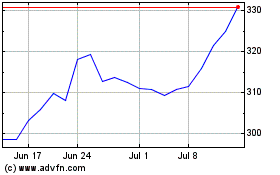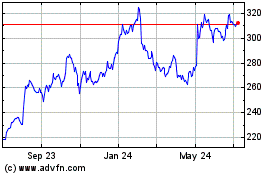Supreme Court to Weigh How Soon Firms Can Sell Copycat Biotech Drugs
January 13 2017 - 4:21PM
Dow Jones News
By Brent Kendall
WASHINGTON -- The Supreme Court on Friday agreed to consider a
dispute between Novartis AG and Amgen Inc. that could determine how
soon cheaper, copycat versions of biotechnology drugs can be sold
to consumers.
At issue is whether a lower court was correct when it made
Novartis's Sandoz subsidiary wait an extra 180 days after U.S. Food
and Drug Administration approval in 2015 before it began selling
Zarxio, a biosimilar version of Amgen's Neupogen, a drug used to
help cancer patients boost their white blood cell production during
chemotherapy.
Congress, through a provision included in the 2010 Affordable
Care Act, sought to spur potential price competition for expensive
biologic drugs by creating an abbreviated approval pathway for
so-called biosimilar medicines.
Zarxio was the first biosimilar approved by the FDA, in March
2015. After the market delay at issue in the Supreme Court case,
Sandoz began selling the drug in September 2015 at a 15% discount
to Neupogen.
Brand-name biotech drugs and biosimilars are manufactured with
living, biological materials, and they generally are more complex
than traditional chemically synthesized drugs and their
generic-drug equivalents.
So far only a handful of biosimilars have received FDA approval.
The go-to-market timing on future biosimilars could depend on the
Supreme Court's ruling.
Sandoz argued it should have been allowed to sell Zarxio six
months sooner. The firm said it gave Amgen 180 days notice before
it marketed a biosimilar product, and that was all Congress
required. Lawmakers didn't intend for biosimilar competitors to
wait another 180 days after FDA approval, Sandoz said.
The Supreme Court previously invited the Obama administration to
submit a brief on whether the court should hear the case. The
administration said it should, and it sided with Sandoz in arguing
that the lower court's interpretation for Amgen was incorrect.
Amgen argued that the required 180 days notice for a new
biosimilar product must come after FDA approval. That approach
gives the original biotech drug manufacturer time to consider
whether to bring patent infringement claims to try to stop the new
drug. If competitors are allowed to give notice before FDA
approval, the incumbent drug company and the courts would waste
time and resources considering whether to block a potential
competing drug that may never be approved, Amgen said.
The high court is likely to hear oral arguments in April, with a
decision expected before July.
Write to Brent Kendall at brent.kendall@wsj.com
(END) Dow Jones Newswires
January 13, 2017 16:06 ET (21:06 GMT)
Copyright (c) 2017 Dow Jones & Company, Inc.
Amgen (NASDAQ:AMGN)
Historical Stock Chart
From Mar 2024 to Apr 2024

Amgen (NASDAQ:AMGN)
Historical Stock Chart
From Apr 2023 to Apr 2024
